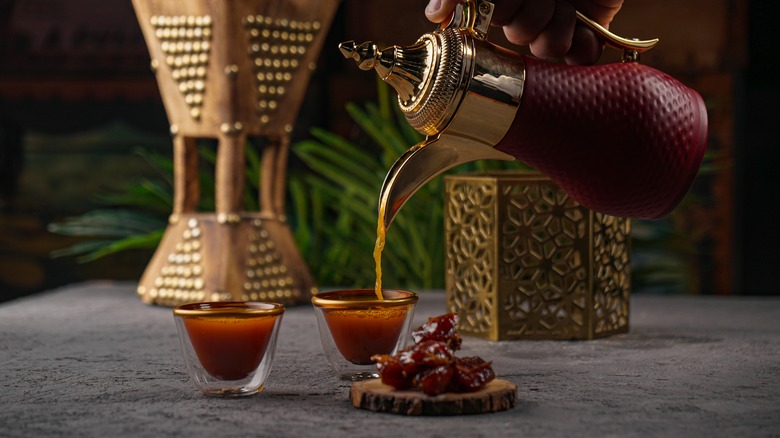There Was A Time When Not Having Coffee Beans Was Reason For Divorce
Ever uttered the phrase, "Don't talk to me before I've had my coffee?" How about, "If you don't have any coffee, don't talk to me again." For the people of the Ottoman Empire, it wasn't a far-off statement, it was the reality.
Coffee has had a long and eventful history from its conception. Pope Clement VIII called it "Satan's Drink" and loved it anyway. Prolific French playwright Honoré de Balzac allegedly drank 50 cups of coffee daily to spur his creativity, per The Vintage News. The still-practiced traditional Ethiopian coffee ceremony takes multiple hours to complete (per How Stuff Works). But nobody was quite as enthusiastic a fan as the people of Saudi Arabia. In fact, per The Collector, the Red Sea port from which coffee was shipped all around the Islamic world was located in Yemen — and it was called "Mocha." (Yes, really.)
The Arabs are credited with inventing coffee sometime during the 15th century, roasting and steeping coffee beans into the beverage originally called "qahwah," which translates to "that which prevents sleep" (per a patent filed by David and Michael Hartkop). The earliest versions were infused with an array of spices, including cinnamon, anise, cardamom, and cloves. (Modern-day fans can swing by Middle Eastern coffee shop Qahwah House on Bedford Avenue in Brooklyn and see what all the hype was/is about.) During these early days, coffee was known as "the Wine of Arabia," and not having coffee beans was even a reason for divorce.
A piping hot cup of equality
The cultural role of coffee became so prominent for the Arab people that a law was passed to ensure people had access to it. For the Arabs, coffee was a thinking person's gasoline; the fuel of the social intellect. Sufi mystics even used it as a tool for staying up late and performing rituals, via The Collector. That's why in Saudi Arabia, if you didn't or couldn't bring coffee grounds home to your wife, it was regarded as a legitimate reason for divorce, per History.
One of the most significant motivators behind coffee's popularity is the fact that Saudi Arabia is the birthplace of Islam and alcohol is forbidden by the Muslim school of thought. That's where coffeehouses came in. All the socialization, sense of community, and idea-sharing that took place in bars but without any of the liquor. The role of religion in coffee's popularity and its subsequent progressive divorce law is particularly interesting, considering divorce was regarded as a major social taboo in many other parts of the world during this period. In 1527, the Catholic church famously forbade King Henry VIII of Britain from divorcing Catherine of Aragon, and it caused the birth of the Anglican church. According to Hurlows Family Law Practice, Ancient Roman divorces were only permitted if they were initiated by the husband. The website for the Pennsylvania-based lawyer Ronald H. Kauffman speculates that the Arabs' coffee-divorce law directly conceptualized the "no-fault divorce" laws practiced in American courts today.

